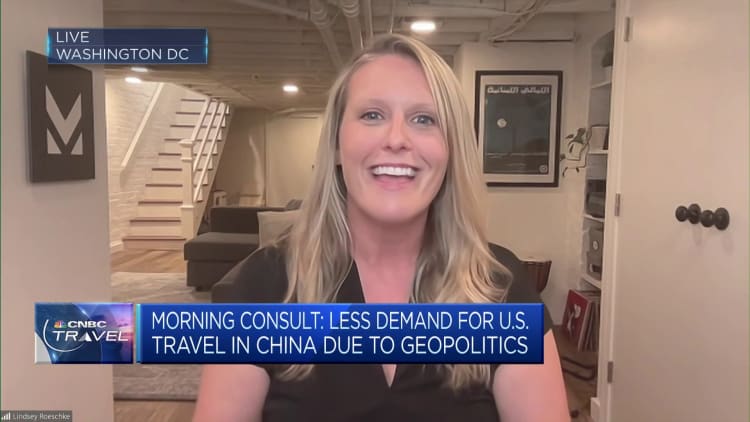
The era of unabated “revenge travel” may be coming to a close.
New reports show that, after years of inflation and rising travel costs, travelers may finally be curtailing their travel plans.
A new report by the research company Morning Consult shows that travel intentions are increasing in several countries, but flatlining or falling in others, most notably in Europe.
Intentions to travel dropped 11 percentage points in France and six in Germany since 2022, according to Morning Consult’s “The State of Travel & Hospitality” report published in September.
Interest to travel also fell in Canada and Russia (-4 percentage points each), the survey showed.
Survey: Jan 2021-July 2023; 14,000 adults; margin of error +/-3%.
Source: Morning Consult
As to whether this suggests pent-up demand is ending: “Yes, our data suggests that is so,” said Lindsey Roeschke, travel and hospitality analyst at Morning Consult.
“That’s not to say that travel will decline significantly again, but … in short, the majority of those who were waiting to take their ‘revenge trips’ have already done so,” she said.

A slowdown may be more pronounced in Europe, said Roeschke.
“Much of this is related to the economy — inflation has eaten away at consumers’ savings in the past year and caused them to reprioritize how they spend,” she said.
An influx of North American tourists over the summer drove prices higher, making travel even more expensive for Europeans. Put together, this paints “a more pessimistic outlook on travel compared to other regions.”
‘Revenge travel likely to fade’
Pent-up demand was expected to have greater staying power in Asia-Pacific, where Covid border restrictions were kept in place longer than other parts of the world.
However, a new report by the economic advisory firm Oxford Economics says “short haul ‘revenge travel’ is likely to fade” in the region.

Pent-up demand fueled travel in Asia-Pacific in the first half of 2023, but since then, the trend is starting to reverse, it states, citing a drop in Singaporean visitors to Malaysia following a surge in late 2022.
“We expect similar, if less pronounced, dynamics for the rest of the region,” as an initial flurry of short-haul trips settles down, the report states.
The reports said arrivals from other parts of the world, especially the United States and Europe, are likely to wane too, as the delayed effects of tightening monetary policies hit travelers’ wallets.
“We are sticking with our call that the U.S. will enter recession around the turn of the year,” the report states. “Travel is for the most part a luxury good and among the first thing to be cut back when times get tougher.”
Chinese consumers ‘losing their gusto’
Morning Consult’s report shows travel intentions are up in several places, namely in China, Mexico and Japan.
However, Japanese enthusiasm to travel remains muted, with just 53% of respondents saying they plan to travel for leisure in the next 12 months — the lowest of the 15 countries in the survey.
Travel is booming in China though. As the country celebrates the “Golden Week” holiday, domestic bookings are up nearly six times — and outbound bookings more than 20 times — year-on-year, according to the Chinese travel agency Fliggy.
But this level of fervor may not last, warns Oxford Economics.
“Chinese consumers are rapidly losing their gusto after the initial reopening spending spurt. High unemployment, negative wealth effects from the troubled property sector, and weak wage growth do not make a strong backdrop for splashing out on foreign holidays,” it states.
The report notes the risk that the longer Chinese tourists travel domestically, a permanent shift in travel preferences may occur among a population where international trips have lost some luster as a status symbol.
Most Chinese tourists are traveling within China and its special autonomous regions of Hong Kong and Macao. One week prior to Golden Week, standard rooms in 22 casino hotels in Macao were sold out for three of the eight-day holiday period, according to GGRAsia, a company that tracks Asia’s casino industry.
The boost purely from pent-up demand may soon run its course.
Moreover, interest among Chinese travelers to visit certain places is falling, according to Morning Consult’s report. Intentions to visit North America fell 23 percentage points from 2022 — far eclipsing a drop in interest from South Korea (12 percentage points) and Japan (9 percentage points).
“The drop in China is particularly concerning,” the report states. “While reasons are a mix of logistical (flight are scarce and expensive) and geopolitical (tensions are high between the U.S. and Chinese governments), the decline is a blow to destinations that were hoping for a more robust recovery.”
Fizzling pent-up demand
Outbound travel from China is set to continue growing, as flight and passport processing constraints ease. But it may not be enough to make up for the loss of travelers from other regions, according to Oxford Economics.
“The tourism boost to Asia has passed its peak,” the report states. “While mainland Chinese are very important to the region … growth in numbers is unlikely to be enough to stop the overall pace of the tourism recovery slowing in most places.”
“The boost purely from pent-up demand may soon run its course,” it states. “Consumers in advanced economies, particularly the U.S., will likely moderate their spending plans in the face of an uncertain economic environment. Others may follow as their home economies catch a cold.”
The travel industry remains bullish, however. A JLL survey published Thursday showed 77% of hotel owners and operators in Asia-Pacific anticipate a rise in occupancy levels in 2024.